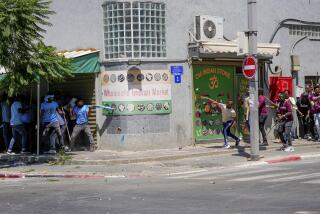Ethiopia Launches New Border Offensive
- Share via
ALGIERS — Eritrea and Ethiopia have accepted cease-fire proposals in principle and are expected to sign a formal agreement within a week, a mediator working to end their 2-year-old border war said Saturday.
But, as Ethiopia launched a fresh offensive, Algerian President Abdelaziz Bouteflika--chairman of the Organization of African Unity, or OAU, which is hosting peace talks--admitted that there still were obstacles to an agreement.
The chief mediator, former Algerian Prime Minister Ahmed Ouyahia, told reporters: “We gave the two parties a one-week deadline to attend a ceremony to sign the cessation of hostilities.”
Eritrea said Friday that it had accepted the OAU’s cease-fire proposals, and Ouyahia said the Ethiopian delegation under Foreign Minister Seyoum Mesfin had accepted them “in principle,” pending a formal endorsement by the government in Addis Ababa.
However, Bouteflika issued a statement saying, “Eritrea and Ethiopia agreed upon a significant number of points, but two sticking points remain.
“One is related to the precise definition of a security zone between the two countries’ armed forces, and the other point is related to some aspects of the composition and the functioning of the international force of peacekeepers.”
Despite the mediation efforts in Algeria, Ethiopia launched a massive offensive Saturday along its front line with Eritrea, saying it had been forced to attack after provocations by the Eritrean army.
The conflict was reignited last month by a punishing offensive in which Ethiopia recaptured all contested territory along the border and then marched deep into Eritrea.
Eritrea was a province of Ethiopia until 1993, when it was rewarded with independence for a 30-year struggle that helped oust Ethiopian Mengistu Haile Mariam in May 1991.
But simmering economic rivalries and a long-standing border dispute erupted into war in May 1998, exacting a terrible human cost on two of the world’s poorest countries. Military analysts say more than 100,000 soldiers have died in the conflict.
The United Nations estimates that 750,000 Eritreans have been displaced, while more than 10 million people in both countries are threatened with drought and famine.
More to Read
Sign up for Essential California
The most important California stories and recommendations in your inbox every morning.
You may occasionally receive promotional content from the Los Angeles Times.













